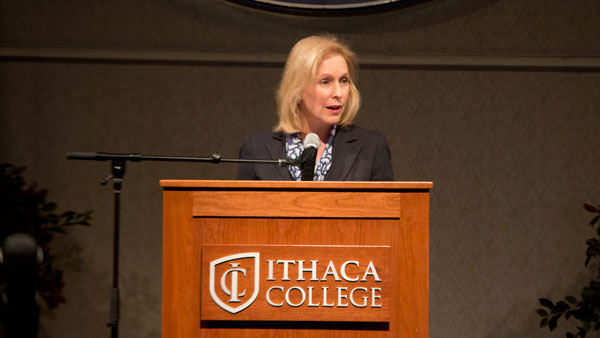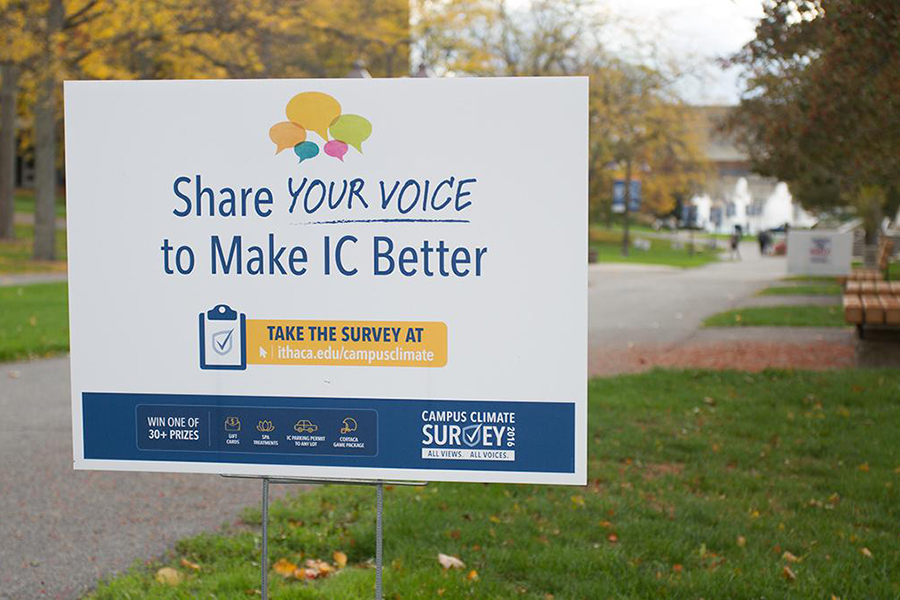Equal pay across genders, a federal minimum wage increase and higher education accessibility were on the agenda when Kirsten Gillibrand, Democratic U.S. Senator from New York, visited Ithaca College on Feb. 3. Gillibrand’s visit was part of her American Opportunity Agenda tour.
Gillibrand is the first sitting U.S. senator to come to campus since Daniel Patrick Moynihan, who served four terms as U.S. Senator from New York between 1977 to 2001, spoke at Commencement in 1978.
Anthony Hopson, assistant vice president of community and government relations, said the college welcomed Gillibrand because her policies are of interest to the college community.
“Her support for elder care, for example, lines well with our work in gerontology,” he said. “Certainly, her American Opportunity Agenda speaks well to the issues of equity and social justice that our students are definitely passionate about.”
Nearly 250 people attended the event, including President Tom Rochon; Ithaca Mayor Svante Myrick; Kara Grippen, the Southern Tier regional director for Governor Andrew Cuomo; and members of the college and local community.
Addressing a question from the audience about her plans related to higher education, Gillibrand said education in science, technology, engineering and mathematics fields and college accessibility are among her top concerns.
“One legislative idea I have is simply to let people refinance their debt, in the same way we refinance our mortgages, loans,” she said. “But for some reason, student debt is not allowed to be refinanced.”
Gillibrand said the majority of student debt is held by people in their 30s, who usually want to start a business or a family, or buy a house, which she said are good opportunities to help the economy grow.
As young people struggle with debt, they are simultaneously expected to live the American Dream. However, Gillibrand said, while the American Dream has not changed over the years, the conditions for earning it have.
“Contrary to the American value that we reward hard work in this country, the real value of workers’ wages is actually on the decline. As a result, families aren’t keeping up, let alone getting ahead,” she said.
She also said the composition of the American workplace has changed to include more women, who are now primary income earners in a growing number of families. However, she said, the country’s policies on women in the workplace have remained stagnant. For every dollar a man earns, a woman earns 77 cents, resulting in a gender wage gap of 23 percent, according to 2012 data from the Institute for Women’s Policy Research.
“They are very much stuck in the past, in the ‘Mad Men’ era, just as President Obama mentioned in his State of the Union address,” she said. “Without a doubt, if given a fair chance, women will be the ones who ignite this economy and lead America’s middle class survival.”
Speaking at the event, Rochon said women make up a majority of Ithaca College, and events such as the Teach, Initiate, Advocate talks, which are a series of presentations on the gender pay gap, and the Elect Her women’s empowerment conference, promote women’s leadership at the college.
“But we also know that we can learn more and do more,” he said. “So Senator Gillibrand, I am grateful that you are here today to focus our attention and stimulate our attention on that important topic.”
One of Gillibrand’s goals is to pass the Fair Minimum Wage Act of 2013, which would increase the federal minimum wage to $10.10 over the next three years. Gillibrand said the current minimum wage puts workers $3,000 below the poverty line.
“The minimum wage is $15,000 a year,” she said. “Imagine, what you are telling people is we want you to work 40 hours a week, a full-time job, but we want you to be still living in poverty.”
Myrick said that a minimum wage of $10.10 today would be equivalent to the minimum wage originally instituted 50 years ago, when considering inflation over the years. He said if the increase did happen, New York would not risk losing businesses.
“One of the things about raising the minimum wage on a state-by-state basis is you worry that you may be encouraging businesses to flee to lower-wage states,” he said. “I don’t think that’s going to be the case in New York state because it’s such a large state, but also there are a lot of reasons to locate here: good schools, good infrastructure.”
One audience member was MaryBeth Bunge, the director of development at Alternatives Impact, a nonprofit affiliate of the of Alternatives Federal Credit Union, which seeks to create economic opportunity for underserved people and communities in Tompkins County.
Bunge said while a $10.10 goal is a good start, it is insufficient, based on a biennial study of the living wage by the Alternatives Federal Credit Union.
“We put a living wage based on our calculations at $12.62 an hour,” she said. “So to propose a minimum wage of $10.10 and to think that people living in major urban environments such as Washington, D.C., … just doesn’t feel even close to being enough.”
Gillibrand has also proposed a revision of the 1993 Family and Medical Leave Act, which provides unpaid leave for serious health related events. However, only half of the workforce currently qualifies for it, while many others cannot afford to take unpaid leave. Gillibrand’s new proposal would make family and medical leave available to every individual through the creation of an independent trust fund within the Social Security Administration. The fund would collect fees from every worker and employer based on their respective weekly wages.
“[The payment] is about the cost of a cup of coffee,” she said. “Because it’s an earned benefit, it would travel with you, whether you are working for a big company or for a small company; whether you are working full time or part time. This benefit will be there when you need it most, when it’s time to care for a newborn child or whether it is time to care for an ailing or dying parent — every worker would have that ability.”
After Gillibrand’s speech, a student member of the audience asked her about how people who are unaware of or do not take courses about issues, such as those relating to women, can be persuaded to rally around an idea.
Gillibrand responded by saying this is a challenge she faces on a regular basis.
“I have to [rally people] in Washington every single day,” she said. “So the best way to do that is to tell someone a story that they will begin to understand how horrible these circumstances are or how unfair something is, when they actually meet someone who has lived through it.”







